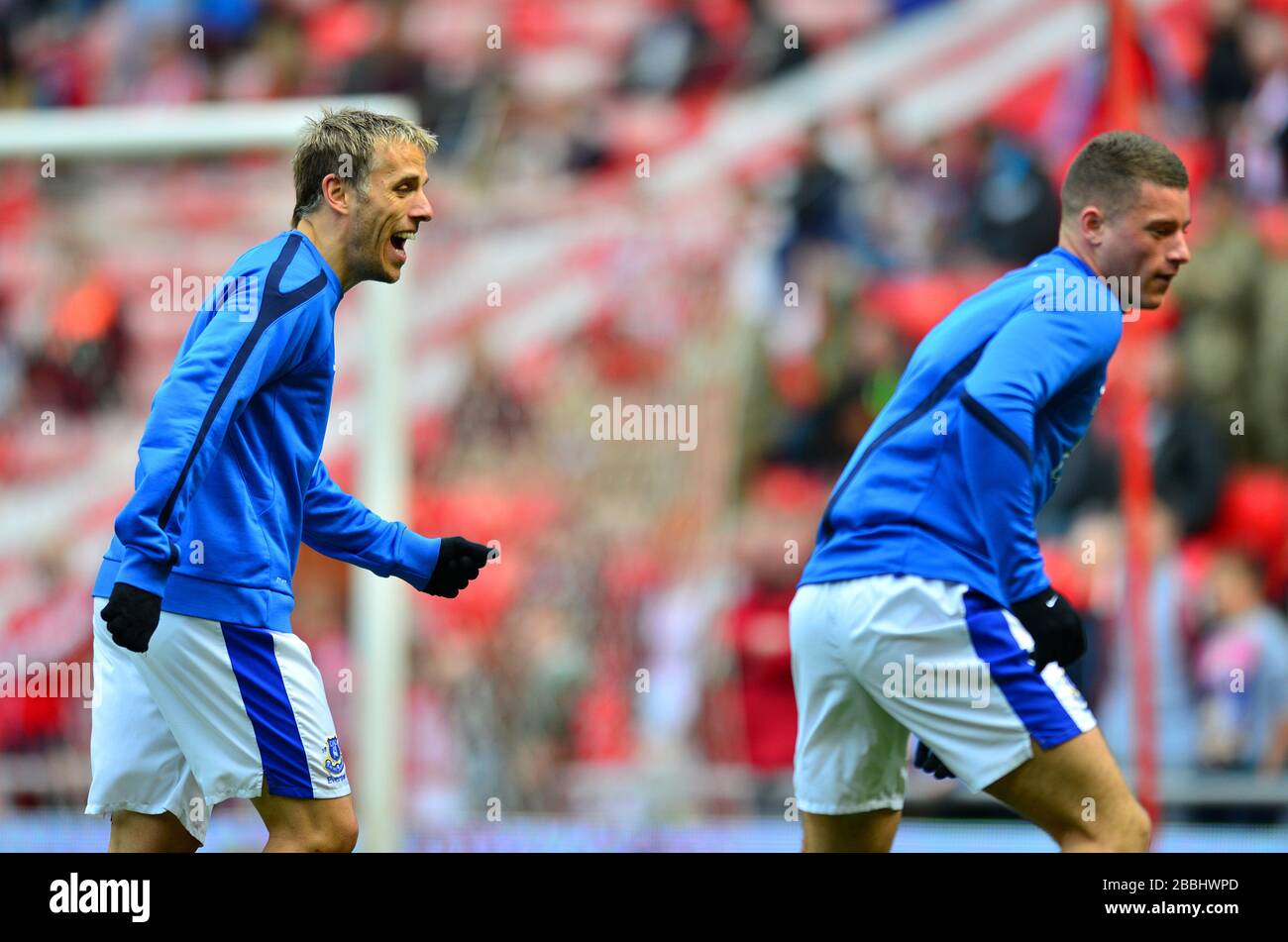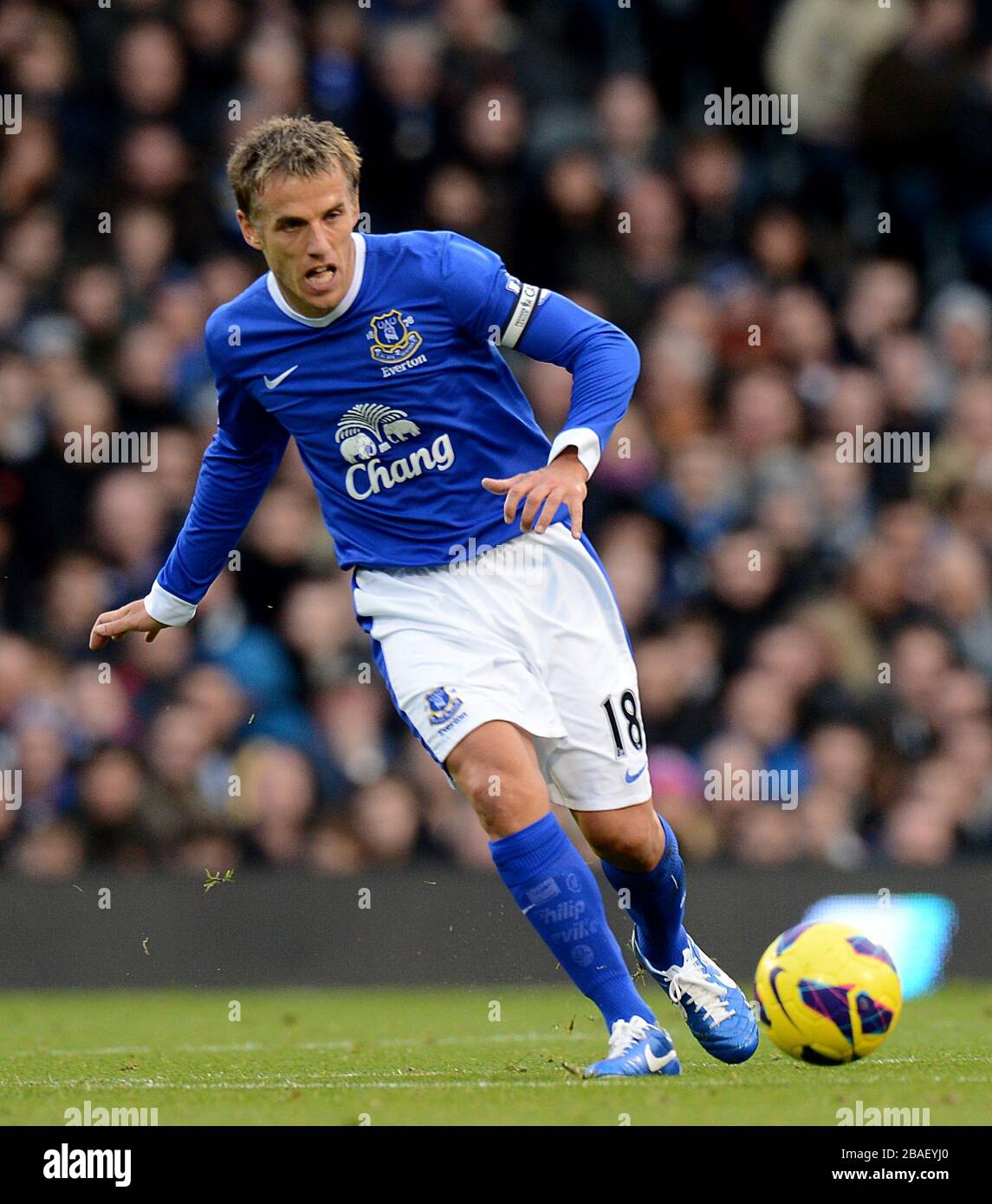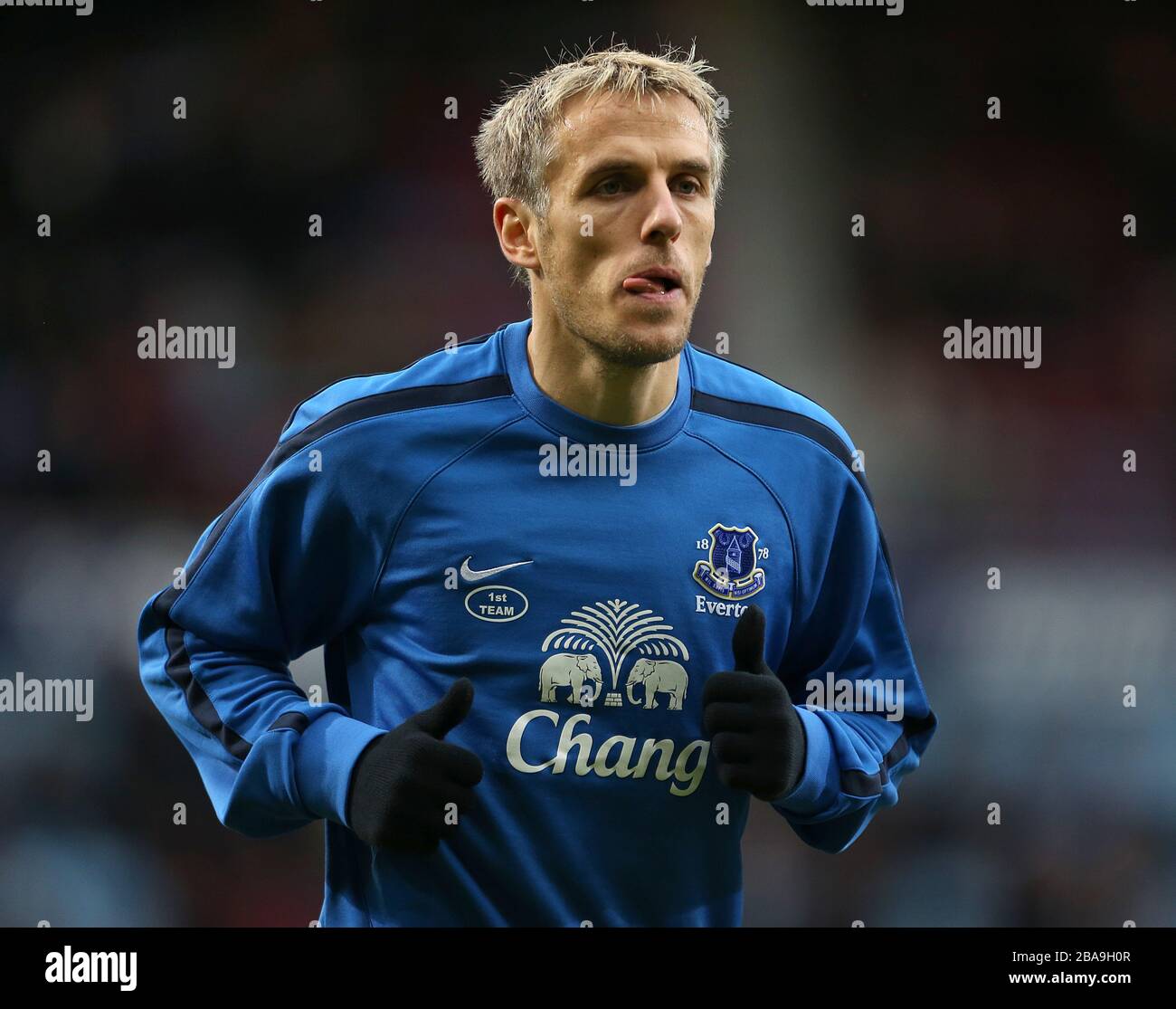When you think about players who truly made a mark at Goodison Park, the name Phil Neville very often comes to mind. His time with Everton was, in a way, quite a significant period for the club, shaping its identity and bringing a certain kind of steely resolve to the team. For many fans, his arrival felt like a fresh start, and his presence on the pitch always seemed to make a difference. It’s a story that still gets talked about, and for good reason, too it's almost a defining chapter in recent Everton history.
Phil Neville, a player known for his strong will and adaptable skills, came to Everton after a long and successful period with Manchester United. This move, quite frankly, was a big deal at the time. It showed a willingness to take on a new challenge and step into a different role, moving from a team that regularly won trophies to one looking to build something special. His journey with the Blues is one that fans still look back on with a good deal of fondness, and a lot of respect, as a matter of fact.
This article will explore the impact Phil Neville had during his time with Everton, from his initial transfer to his role as captain and beyond. We will look at what made him such a key figure for the club, his contributions on the field, and the lasting impression he left on the fanbase. It’s a chance, you know, to remember a player who gave his all for the badge, and who truly embodied the spirit of the club, in a way.
Table of Contents
- Biography: A Football Life
- The Arrival at Goodison Park
- Versatility and Dependability
- The Captaincy and Leadership
- Key Moments and Contributions
- Phil Neville's Legacy at Everton
- Frequently Asked Questions About Phil Neville at Everton
- What Phil Neville Means to Everton Now
Biography: A Football Life
Phil Neville's football journey began very early, really, coming through the youth ranks at Manchester United alongside his brother Gary. He was part of that famous "Class of '92" group, which achieved so much success under Sir Alex Ferguson. He won many trophies there, including the Premier League title multiple times and the Champions League, too. He was a solid, reliable player for them, often playing in various defensive roles, showing his ability to adapt to what the team needed. He played with some of the very best players in the world, and learned a lot from that experience, you know.
After many years at Old Trafford, a new challenge beckoned, and that's when Everton came calling. This move marked a significant shift in his career. He was no longer just a dependable squad player; he was coming to a club where he would be a senior figure, a leader, and someone the team would look to for guidance. This change, in some respects, allowed him to show a different side of his footballing personality, one that involved more responsibility and a greater influence on the team's overall approach. It was, arguably, a move that truly defined his later playing years.
Following his playing career, Phil Neville moved into coaching and punditry. He worked with the England Under-21 team, and then joined the coaching staff at Manchester United for a short period. Later, he took on the role of manager for the England women's national team, leading them in major tournaments. He also managed Inter Miami in Major League Soccer, showing his desire to keep learning and growing within the game. His career, it seems, has always been about football, in one way or another, constantly seeking new ways to contribute.
Personal Details and Bio Data
| Detail | Information |
|---|---|
| Full Name | Philip John Neville |
| Date of Birth | January 21, 1977 |
| Place of Birth | Bury, England |
| Playing Position | Defender, Midfielder |
| Youth Career | Manchester United |
| Senior Clubs (as player) | Manchester United, Everton |
| International Career | England |
| Managerial Roles | England Women, Inter Miami |
The Arrival at Goodison Park
Phil Neville made the switch to Everton in August 2005. This move came as a bit of a surprise to some, given his long association with Manchester United, a club where he had spent his entire career up to that point. However, for Everton manager David Moyes, bringing in someone with Neville's experience and winning background was a very clear statement of intent. It showed the club's ambition to compete at a higher level and to bring in players who understood what it took to succeed. The fans, too, were generally excited by the prospect of such a seasoned professional joining their ranks, hoping he would bring some of that winning mentality with him, you know.
His first season at Everton saw him quickly settle into the team. He wasn't just a new face; he was someone who immediately showed his commitment and his desire to perform. He played in various positions, showing his adaptability, which was a huge asset for the squad. His arrival also brought a different kind of presence to the dressing room. He was a vocal leader, someone who demanded high standards from himself and from those around him. This kind of influence, very early on, helped to set a tone for the team, pushing everyone to be better, actually.
The transfer fee, reportedly around £3.5 million, seemed like a very good deal for Everton. They were getting a player who, despite leaving a top club, still had plenty to offer in terms of his playing ability and, perhaps more importantly, his experience. He was a player who had been in big games, won big trophies, and understood the pressures of top-level football. This knowledge, honestly, was something Everton desperately needed at that time, as they looked to establish themselves as a consistent force in the Premier League. His presence, in short, gave the team a real boost.
Versatility and Dependability
One of Phil Neville's most remarkable qualities during his time at Everton was his incredible versatility. He could play in so many different positions, and he would always give his absolute best, no matter where he was asked to play. He spent time at right-back, left-back, and in central midfield, sometimes even filling in at centre-back. This ability to adapt was a huge benefit for David Moyes, as it gave the manager a lot of options and flexibility when it came to team selection. It meant that if there were injuries or suspensions, Neville could always step in and do a solid job, which is very valuable, as a matter of fact.
His dependability was another hallmark of his play. You knew what you were going to get from Phil Neville every single time he stepped onto the pitch. He was consistent, hardworking, and always put the team first. He wasn't a player who relied on flashy tricks or moments of individual brilliance. Instead, his game was built on solid defending, intelligent passing, and a tireless work rate. This kind of reliable performance, week in and week out, is something that managers truly appreciate, and it made him an almost indispensable part of the Everton squad for many seasons. He was, in a way, the glue that held things together in various parts of the field.
This combination of versatility and dependability made him a fan favorite, too. Supporters appreciate players who show such commitment and who are willing to do whatever it takes for the team. He might not have scored a lot of goals, but his contributions were often about breaking up play, winning possession, and linking defense with attack. His performances, very often, laid the groundwork for others to shine, and that, you know, is a very important role in any football team. He was a true professional, always ready to do his job, and do it well, for the club.
The Captaincy and Leadership
Phil Neville's leadership qualities became very clear early in his Everton career. He wasn't just a player; he was a natural leader, someone who spoke up, organized those around him, and set an example through his actions. It was no surprise, then, when he was given the captain's armband for the 2007-2008 season. This was a significant moment, showing the trust David Moyes had in him and the respect he had earned from his teammates. Being captain of a club like Everton, which has such a rich history and passionate fanbase, is a very big responsibility, and he took to it with great seriousness, actually.
As captain, Neville's influence extended far beyond the pitch. He was a voice in the dressing room, someone who could motivate players, offer advice, and help to maintain a strong team spirit. He understood what it meant to represent a football club, and he instilled that sense of pride and duty in others. His leadership was often quiet but firm, based on his own disciplined approach to the game and his unwavering commitment. He led by example, working harder than anyone, and always putting the team's needs before his own. That, you know, is the mark of a truly effective captain, and he embodied it fully.
He was known for his calm demeanor under pressure, which was especially important in tight games or when the team was going through a difficult spell. He would often be the one to rally the players, to encourage them, and to keep them focused on the task at hand. His time as captain saw Everton consistently challenge for European places and reach cup finals, which speaks volumes about the stability and direction he helped to provide. He was, in a way, the heartbeat of the team for many seasons, guiding them through thick and thin, and always fighting for every point. Learn more about Everton Football Club on our site, and link to this page for more historical details.
Key Moments and Contributions
Phil Neville's time at Everton was filled with many memorable moments and crucial contributions, even if they weren't always the ones that grabbed the headlines. One very important aspect of his play was his ability to make vital interceptions and tackles, breaking up opposition attacks and protecting the defense. He was a master of the unsung hero role, doing the dirty work that allowed more attacking players to shine. His defensive awareness and positioning were consistently excellent, and he very often seemed to be in the right place at the right time, which is just good football sense, really.
He also contributed with his passing, often playing simple but effective balls to get the team moving forward. While not a prolific goalscorer, he did chip in with a few important goals during his Everton career. These goals, though few, often came at significant moments, adding to his reputation as a big-game player. For instance, his penalty against Fiorentina in the UEFA Cup shootout, even though Everton ultimately lost, showed his courage and willingness to step up when it mattered most. That, you know, is the kind of character trait that fans truly remember and appreciate in a player, as a matter of fact.
Beyond his individual actions, Neville's greatest contribution might have been his role in shaping the team's character. He helped to foster a winning mentality and a strong work ethic within the squad. He was part of Everton teams that consistently punched above their weight, challenging the established "big four" and regularly finishing in the top half of the Premier League. His presence helped to create a cohesive unit, a team that was tough to beat and always fought until the very end. This enduring quality, in a way, is a testament to the kind of player and leader he was for the club, shaping its very spirit for a number of years.
Phil Neville's Legacy at Everton
Phil Neville left Everton in 2013, after eight seasons and 303 appearances for the club. His departure marked the end of a very significant chapter, both for him personally and for Everton. He wasn't just a player who came and went; he became deeply ingrained in the fabric of the club. His move from Manchester United to Everton was, in some respects, a bold one, and it paid off handsomely. He proved that he could be a central figure in a team, not just a supporting one, and he did so with great distinction. His time at Goodison Park is remembered very fondly by supporters, and that, you know, is a true measure of his impact.
His legacy at Everton is one of professionalism, dedication, and unwavering commitment. He embodied the "School of Science" ethos that Everton is often associated with – a focus on hard work, tactical discipline, and a strong team ethic. He helped to bridge the gap between different eras of the club, providing stability and leadership during a period of consistent performance under David Moyes. He showed younger players what it took to be a top professional, and his influence on the training ground and in the dressing room was undoubtedly immense. He really did leave a lasting mark on the club, honestly.
Even today, when Phil Neville is seen as a pundit or discusses football, his time at Everton is often brought up. It’s a period of his career that holds a lot of significance, not just for him, but for the fans who watched him play. He remains a respected figure among the Everton faithful, a player who truly gave his all for the badge, and who helped to build a very competitive team. His story is a good reminder, too, that loyalty and hard work can create a lasting bond between a player and a club, a bond that goes beyond just the results on the pitch, in a way.
Frequently Asked Questions About Phil Neville at Everton
Here are some common questions people often ask about Phil Neville's time with Everton:
How long did Phil Neville play for Everton?
Phil Neville played for Everton for eight seasons, from 2005 to 2013. He made over 300 appearances for the club during that period, becoming a very important part of the team, you know, for a good number of years.
Was Phil Neville captain of Everton?
Yes, Phil Neville was indeed the captain of Everton. He took on the captaincy for the 2007-2008 season and held that role until his departure in 2013. He was a very respected leader on and off the field, too, by his teammates and the fans.
What position did Phil Neville play for Everton?
Phil Neville was known for his versatility at Everton. He played in several positions, including right-back, left-back, and central midfield. This adaptability made him a very valuable player for the team, as he could fill in wherever he was needed, as a matter of fact.
What Phil Neville Means to Everton Now
Phil Neville's impact on Everton is still felt, in a way, even years after his playing days at Goodison Park ended. He represents a period of stability and strong performance for the club, a time when Everton was consistently challenging at the top end of the Premier League and competing in European competitions. His leadership, his work ethic, and his sheer determination left an almost indelible mark on the team and the fanbase. He was a player who understood the club's values and embodied them on the pitch every single week. That, you know, is a quality that fans truly cherish, and it makes him a respected figure even today.
For many supporters, Phil Neville symbolizes a particular era of Everton football, one built on resilience, tactical discipline, and a strong collective spirit. His journey from Manchester United to becoming an Everton captain is a story that resonates with fans, showing that loyalty can be built through commitment and performance, regardless of a player's previous club. He is often cited as an example of a true professional, someone who always put the team first and gave his absolute best. So, when people talk about the kind of players Everton needs, Phil Neville's name very often comes up as a benchmark for what it means to be a "Blue."
If you want to keep up with the latest news and updates about Everton Football Club, you can always visit the official Everton website. It features the latest news, player profiles, and ticket information, giving you all the details you need to stay connected with the club's present and future. For more on football news and analysis, you might also check out a reputable sports news site like Football News Insights. Staying informed about the club’s journey and the wider football world is, arguably, a big part of being a passionate supporter, and Phil Neville’s story is very much a part of that ongoing narrative.



Detail Author:
- Name : Gracie Vandervort
- Username : marcos95
- Email : mdonnelly@hotmail.com
- Birthdate : 2005-03-21
- Address : 9349 Halvorson Fields Houstonside, MO 98798
- Phone : +1.678.379.8126
- Company : Jenkins, McDermott and Hilpert
- Job : Technical Specialist
- Bio : Et ea et voluptate at assumenda animi minus error. Et aperiam neque ut. Quisquam minima quia maxime est.
Socials
facebook:
- url : https://facebook.com/lon_real
- username : lon_real
- bio : Nostrum cumque ea sit aperiam. Corrupti quo quam quia fuga.
- followers : 2443
- following : 1378
instagram:
- url : https://instagram.com/lon_real
- username : lon_real
- bio : Quia vel saepe voluptas. Nam consequatur eaque commodi atque et. Explicabo odit ipsa aut ducimus.
- followers : 1931
- following : 1690